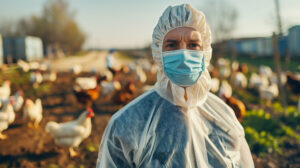Key Points:
- In today’s Recommendation for Industry, we discuss the continuing evolution of COVID vaccines. Read more below.
- Feds look ahead to next-generation COVID vaccines. Federal officials have signaled that second boosters for those under 50 are on hold to speed production of new bivalent shots. The new bivalent booster shots will include the original SARS-CoV-2 strain and Omicron. Health officials are waiting to see if vaccine makers can more quickly deliver the updated boosters, by the middle of September, unnamed sources told the Washington Post. At the global level, researchers are working on a roadmap for developing a new coronavirus vaccine to broadly protect against the most dangerous ones.
- In COVID-19 Omicron patients, high blood pressure doubles risk of hospitalization. People who have high blood pressure and Omicron-variant COVID-19 are at more than double the risk for hospitalization—even if they received three mRNA vaccine doses, according to a single-center study published yesterday in Hypertension. Some risk factors for hospitalization were identified as hypertension, older age, chronic kidney disease, and heart attack. Other previously identified risk factors for severe COVID-19, such as obesity and diabetes, weren’t as strongly linked to hospitalization and Omicron. The main take away from this study is that individuals, no matter how many vaccine doses you have acquired, everyone should do their best at avoiding infection.
- China approves Genuine Biotech’s HIV drug for COVID patients. The Azvudine tablet, which China approved in July last year to treat certain HIV-1 virus infections, has been given a conditional green light to treat adult patients with “normal type” COVID. In a late-stage clinical trial, 40.4% of patients taking Azvudine showed improvement in symptoms seven days after first taking the drug.
- Canada Resuming Random Testing of International Air Passengers. Random testing was paused on June 11 as a part of broader strategy to test travelers outside of the airports, but testing resumed on July 19th at Canada’s four major airports. Air travelers who are selected for mandatory random testing will receive an email notification within 15 minutes of completing their customs declaration. The reasoning behind resuming the testing is so that Canada can track the importation of COVID and the news variants of concern. Canada requires travelers arriving from other countries to be fully vaccinated, which means they received a primary series of COVID-19 shots at least 14 days before arriving. Travelers who aren’t vaccinated because they are exempt must test for COVID-19 for 10 days after arriving. Any travelers who test positive or develop symptoms are required to isolate for 10 days.
Public Health & Food Safety:
- WHO director declares monkeypox a public health emergency. Over the weekend, Director-General of the World Health Organization (WHO) Tedros Adhanom Ghebreyesus, PhD, decided that the ongoing international monkeypox outbreak was a public health emergency of international concern (PHEIC) after a meeting of advisors failed to reach a consensus on the matter. The United States has added 298 cases since last week’s total, raising the number to 2,891. The number of affected jurisdictions remains at 46. The CDC reported late last week that the US has two confirmed cases of monkeypox in children. There are eight cases among women. The US has not yet declared monkeypox a public health emergency, but it is being discussed within the White House. Recommendations are issued for 4 groups of countries:
- Those that have not yet reported a case of monkeypox or have not reported a case for more than 21 days.
- Those with recently imported cases of monkeypox and that are experiencing human-to-human transmission.
- Those with transmission of monkeypox between animals and humans.
- Those with manufacturing capacity for diagnostics, vaccines, and therapeutics.
- Largest monkeypox study to date highlights new symptoms. Many of the people infected in an international monkeypox outbreak experienced a single lesion or sore in their mouth or on their genitals, a departure from typical symptoms of the virus that could lead to clinicians to misdiagnose monkeypox as another sexually transmitted infection (STI). The new international study included clinical observations from 528 confirmed infections. Among those individuals observed, 13% were hospitalized for their infection. One in 10 people had only a single skin lesion in the genital area, and 15% had anal and/or rectal pain, a symptom not typically seen in other monkeypox outbreaks. In a second study, 91.7% of patients were men who have sex with men (MSM), and detailed sexual history showed that those who reported having anal-receptive intercourse had longer incubation periods (8 vs 6 days) and higher rate of systemic symptoms before the rash (62.0% vs 27.6%) and presented more frequently with proctitis (32.9% vs 6.9%) than MSM who did not engage in this type of sexual practice.
- Consumer Reports warns that tara flour isn’t safe and should be avoided. Daily Harvest CEO Rachel Drori admits that her company has identified tara flour as the cause of more than 470 reported illnesses. Last month, Daily Harvest and the FDA announced a recall of the product “Fresh Lentil and Leek Crumbles,” after multiple reports of consumers becoming ill after eating it. Tara flour is an additive that Daily Harvest identified as the culprit of the recent outbreak that was contained within their recalled product. “Because the reported symptoms have been so severe and so little is known, we’re advising people to avoid tara flour until we understand what is causing the illnesses, and until consumers can be assured that any products containing tara flour in the wider market are safe,” says James E. Rogers, Ph.D., director of food safety and testing at Consumer Reports.
- FDA Works to Enhance the Safety of Berries. Currently the FDA is developing a food safety prevention strategy to enhance the safety of fresh and frozen berries. The strategy is being developed due to a history of hepatitis A (HAV) and norovirus (NoV) outbreaks that were linked to both fresh and frozen berries. To date, the FDA has collected and tested more than 1,100 samples under this assignment and plans to collect and test about 427 more to meet the assignment’s public health goals. The FDA plans to work collaboratively with industry, academia, and regulatory partners in the development of the food safety prevention strategy to identify measures that can be taken to limit or prevent contamination from occurring throughout the berry supply chain, approaches to re-enforce control measures and their application, and areas where additional research is needed.
Recommendations for Industry
COVID Vaccines Continue to Evolve
As infectious disease experts and researchers continue to improve their knowledge of COVID, even with its continued evolution, vaccines continue to be evolved and improved as well. The current evolution in development is that of bivalent boosters for which an omicron BA.4/5 spike protein component is added to the current vaccine composition to create a two-component (bivalent) booster vaccine.
FDA is, in fact, advising manufacturers seeking to update their COVID-19 vaccines to focus on these bivalent vaccines, so that the modified vaccines could potentially be used starting in early to mid-fall 2022.
Some experts and federal officials are beginning to recommend that those under 50 hold off on getting further booster shots until bivalent vaccines become available. While this does have potential population benefit – assuming their efficacy – it may not be the best decision for each individual. Because of this, we’d recommend that individuals discuss options with their healthcare provider to make the best decision for them.
Meanwhile, individuals and businesses should continue to stay aware of the continuing evolution of both COVID and its vaccines – and TAG will continue to keep you updated on this and other infectious disease news and events in this newsletter.
In case you missed it:
- In last Thursday’s Recommendation for Industry, we discussed how COVID cases are rising. Read more here.
- CDC panel recommends Novavax vaccine as BA.5 gains more ground. On July 19, CDC vaccine advisers unanimously approved recommended the use of the Novavax COVID-19 vaccine for the primary series for people 18 years and older. The CDC director has accepted ACIP’s recommendation to utilize Novavax for individuals 18 years of age and older. Currently, experts want to target the primary Novavax vaccine to the 10% to 13% of the US population that is currently unvaccinated. The Biden administration has bought 3.5 million doses of the vaccine, which is administered in a two-dose series given 3 to 8 weeks apart. Those with moderate or severe immune compromise should receive the doses 3 weeks apart. CDC officials said on July 19, if orthopox vaccine is given first, healthcare providers should consider waiting 4 weeks before administering COVID-19 vaccine. And if Novavax or another COVID-19 vaccine is given first, orthopox vaccination should not be delayed.
- Global COVID-19 cases plateau, but deaths rise. After 5 weeks of increasing cases, the pace of new infections plateaued last week, the WHO said. It received reports of nearly 6.3 million new cases. The five countries with the most cases were the United States, France, Italy, Germany, and Japan. The WHO received reports of 11,000 deaths last week, with the global rise fueled by increases in three regions: Southeast Asia, the Eastern Mediterranean, and the Americas. Global COVID-19 activity stayed high and largely even last week, as deaths rose, the World Health Organization (WHO) said today in its latest weekly update on the pandemic.

- The C.D.C. shuts down its public Covid dashboard for cruise ships. The Centers for Disease Control and Prevention has ended its Covid-19 mitigation program for cruise ships in U.S. waters, the public health agency announced on its website. Cruise lines participating in the voluntary program, which ended Monday, had followed the agency’s policies for coronavirus testing and reporting the vaccination status of passengers and crew, as well as providing regular updates about coronavirus case counts.
- CDC Community Level Map:

Public Health & Food Safety:
- WHO: 14,000 monkeypox cases worldwide, 5 deaths. The WHO reported on July 20, monkeypox cases have nearly reached 14,000, including 5 deaths in African nations. On July 21, the International Health Regulations Emergency Committee will review the latest data and consider whether the outbreak of monkeypox constitutes a public health emergency of international concern. Earlier this week, the WHO updated its guidance for men who have sex with men (MSM), the group most at risk for infection. The agency urged MSM to be aware that symptoms can develop within 21 days of contact with an infected person and said MSM should self-isolate while waiting for test results. The UK has a national total of 2,137 monkeypox cases currently recorded. The United States has 45 jurisdictions with cases, totaling the whole country with 2,108 cases.
- IAFP going to an open-access journal. The Journal of Food Protection (JFP) beginning in January 2023 will be published as a fully open access publication, the International Association for Food Protection (IAFP) announced Wednesday with Elsevier, the Netherlands-based academic publishing company specializing in scientific, technical, and medical content. JFP will join other Elsevier products including journals such as The Lancet, Cell, the ScienceDirect collection of electronic journals, Trends, the Current Opinion series, the online citation database Scopus, the SciVal tool for measuring research performance, the ClinicalKey search engine for clinicians, and the ClinicalPath evidence-based cancer care service.
- FDA Issues Country-Wide Import Alert for Enoki Mushrooms from the Republic of Korea. This alert was issued to protect public health and to prevent the importation of enoki mushrooms that could be linked to human infections; Import Divisions may detain without physical examination importations of enoki mushrooms from the ROK. During 2021, FDA testing revealed that 43% of enoki mushrooms sampled from the ROK were contaminated with Listeria monocytogenes. The sampling performed from March 2020 through May 2022, was due to a multistate outbreak that spanned from 2016-2020 linking these mushrooms to the Republic of Korea.





